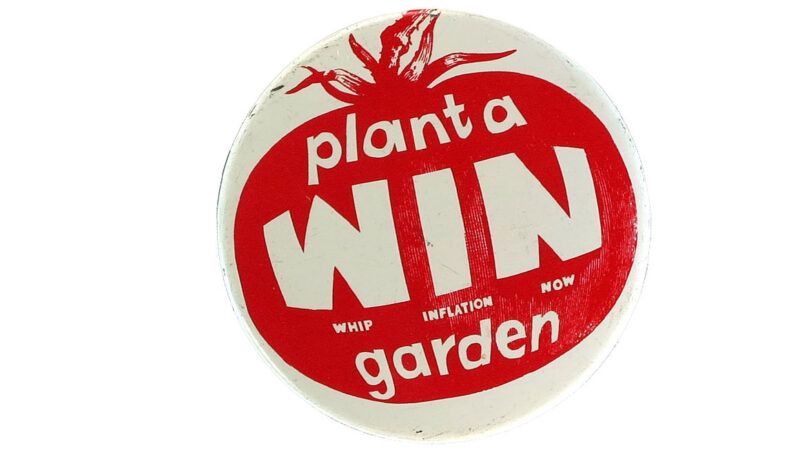A Young Joe Biden Mocked Gerald Ford's 'Whip Inflation Now' Slogan. Now He Faces His Own Inflation Mess.
During his own inflation crisis, President Ford called on the American public to do their part through personal fiscal discipline.

Republican President Gerald Ford was simultaneously one of the luckiest and unluckiest presidents when he took office in 1974. He was lucky because he got the job without ever being on a ballot outside of Michigan's 5th Congressional District. He was unlucky because the country was experiencing the worst inflation since 1947.
Inflation that August would hit 10.9 percent, then rise to 11.9 percent in September, with huge increases in food and energy prices. Federal spending on the Vietnam War and Great Society programs had ballooned, and the Bretton Woods monetary system, which sought to maintain global currency values, had collapsed. To his credit, Ford did not shy away from talking about inflation. "My conclusions are very simply stated," he said in an address to Congress that October. "We must whip inflation right now."
Ford's policy prescriptions in that speech were a mixed bag. The better ideas included deregulation of natural gas supplies, removal of acreage limits on a few agricultural products, and, most important, a rejection of price controls and rationing. "Peacetime controls actually, we know from recent experience, create shortages, hamper production, stifle growth, and limit jobs," Ford said, adding that they would "cause the fixer and the black marketeer to flourish while decent citizens face empty shelves and stand in long waiting lines."
But Ford also proposed expanded unemployment benefits, stricter antitrust enforcement, a windfall tax on oil producers, and a $5 billion tax hike on corporations and wealthy individuals to pay for new spending. Although he eschewed mandatory price controls, his Council on Wage and Price Stability, which had no compulsory power, was charged with holding "public hearings to justify either price or wage increases."
Because few of the proposals were adopted, the speech is most remembered for the way Ford applied wartime mobilization messaging to an economic crisis. He called on people to do their part with personal fiscal discipline. "Unless every able American pitches in, Congress and I cannot do the job," he said. To lower food prices, "grow more and waste less." To lower energy costs, "drive less, heat less." Ford added that "there will be no big federal bureaucracy" to mobilize the public or a "sudden Pearl Harbor to shock us into unity."
Americans responded by making "Whip Inflation Now" (WIN) pins, along with stickers, jewelry, and clothes. Some even put WIN on their footballs, coasters, baby bibs, watches, and knit sweaters. According to a 2021 Washington Post retrospective, more than 15 million orders were placed for WIN buttons, and hundreds of thousands of people wrote to the White House in support of the campaign.
But it was only a matter of months before people got tired of WIN-ing. Inflation remained in the double digits for another six months and did not fall below 5 percent until November 1976, the month Ford narrowly lost to Jimmy Carter.
While Ford's proposals had some basis in economics—energy and food deregulation should result in more supply—pins and stickers couldn't change incentives or reduce demand. Alan Greenspan, freshly minted as chairman of the Council of Economic Advisers when the WIN campaign began, later wrote that it was "unbelievable stupidity." Joe Biden was serving his first term as senator at the time, and The Washington Post says he "criticized Ford's economic plan as trying to fight inflation with slogans."
Now Biden faces his own inflation dilemma. In June 2022, prices were 9.1 percent higher than 12 months before, a 41-year high reaching almost back to Ford's administration. Food and energy price hikes were again the primary symptoms of inflation, with both categories seeing their largest increases in decades.
Ford blamed foreign oil-producing nations for high prices. Biden blames oil companies and gas stations. Ford was in the midst of a recession with 6 percent unemployment. Under Biden, the unemployment rate was just 3.6 percent as of June, with the economy dipping into a recession.
Perhaps Biden is similarly unlucky to have been elected in the midst of a pandemic. The Federal Reserve also deserves blame for what Hoover Institution economist John Cochrane says was a "major institutional failure" to predict high inflation and raise interest rates sooner. But Biden is responsible for the last and largest round of stimulus checks, and he refuses to take the limited executive actions available to him: cutting tariffs and encouraging domestic oil and gas production.
Perhaps our failure to learn the lessons of past inflationary eras deserves a new slogan: Whip Inflation Eventually.
This article originally appeared in print under the headline "Inflation Won't Whip Itself."


Show Comments (59)